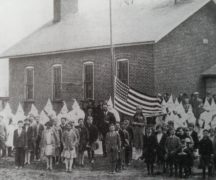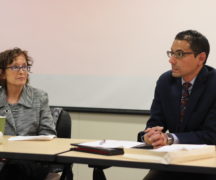With persecution, poverty, and climate change driving large numbers of migrants to the southern border, some in politics and the media are again pushing the panic button.
It’s hardly new. More than a century ago, a publication you would hardly expect was pushing an absurd conspiracy theory against a group about whom you probably know little.
Over-the-top claims about immigrants are not harmless.
For example, Ohio Secretary of State and U.S. Senate aspirant Frank LaRose last week posted this about the southwestern border on X, the social media site formerly known as Twitter:
“This is an invasion. There’s no other word to describe it. If President Biden had the guts, he’d finish the wall and put pressure on our neighbors to the south to do something about it. But his vacation is more important!”
LaRose either doesn’t know or he ignores that the most common definition of “invasion” is “incursion of an army for conquest or plunder.” He also forgets or doesn’t care that when Patrick Crusius drove to an El Paso Walmart in 2019 and murdered 23 people, he said it was “a response to the Hispanic invasion of Texas.”
Words have meanings. And they can have consequences, as it turns out.
In the 1890s, the same sort of irresponsible rhetoric was being used. Only then, it was the New York Times pushing it and its targets were French Canadians, who make up half of my ancestry.
The belief that white Protestants are the only true Americans has been stubborn, but it’s belied by some pretty basic history.
Native peoples, of course, got here first. Vikings made it to Newfoundland in 1021, but couldn’t make a go of it. Then, in 1519, Hernan Cortez began his conquest of what is now Mexico and began a great mixing between Europeans and natives that created the Hispanic peoples that Crusius and many others so ignorantly hate.
In 1607, the English founded Jamestown in what is now Virginia. And a year later, Samuel de Champlain founded Quebec and New France.
It might seem quaint now, but even after the United States was founded and the Constitution separated church and state, religion remained a major irritant between Protestant-led New England and Catholic-dominated Quebec. For example, a mob of anti-immigrant Know Nothings in 1854 burned a Catholic church in Bath, Maine where French Canadians and Irish parishioners worshiped, David Vermette wrote in a 2019 article in Smithsonian Magazine.
Then the Civil War came and New England’s dominant industry — textiles — lost its supply of southern, slave-grown cotton. The mostly Protestant workforce sought employment elsewhere, with many drifting off to the west.
When the war ended, cotton again flowed north, the factories reopened and Quebecois streamed south to fill textile jobs in hopes of a more prosperous life. And as they did, demagogues claimed there was a diabolical, hidden agenda — that the French Canadians planned to take over.
“In this climate, the supposed French Canadian Catholic subversion of New England became national news,” Vermette wrote. “Between about 1880 and 1900, as immigration peaked, it attracted coverage in daily newspapers; think pieces in outlets such as Harper’s, The Nation, and The Forum; articles in academic journals; and books in English and in French.”
The New York Times was a particular offender.
“It is next to impossible to penetrate the mass of protected and secluded humanity with modern ideas or to induce them to interest themselves in democratic institutions or methods of government,” it wrote of French Canadians on June 6, 1892. “They are almost as much out of reach as if they were living in a remote part of the Province of Quebec. No other people, except the Indians, are so persistent in repeating themselves. Where they halt they stay and where they stay they cover the Earth.”
Never mind that by 1892, covering the Earth was the profound opposite of what the Indians were doing. Especially when it comes to conspiracy theories, people believe what they want to be true.
The New York Times article gets even more fevered after that whopper. In the timeless fashion of the conspiracy theory, it makes contradictory claims and then races past the contradictions.
It asks readers to believe a people could be so unimaginative while simultaneously participating in a secret, sweeping plot. And it asks readers to forget the most obvious explanation for French Canadian or any other group’s migration: that they needed the money.
The story favorably mentions a piece written for the American Antiquarian Society by one Dr. Egbert C. Smyth. It claimed “this migration is part of a priestly scheme now fervently fostered in Canada for the purpose of bringing New England under the control of the Roman Catholic faith. (Smyth) points out that this is the avowed purpose of the secret society to which every adult French Canadian belongs and that the prayers and earnest efforts of these people are to turn the tables in New England by the aid of the silent forces which they control.”
The supposed plot was even bigger than described there. The goal, allegedly, was the Catholic subversion of New England, the Maritime Provinces and even some U.S. states to the west and to reestablish a French nation in North America. All to be silently carried out by people who were supposedly so stupid they barely knew they were alive.
In the event, it was silent indeed.
My first French Canadian ancestors to come to Columbus were here by the 1870s, there were arrivals thereafter and family ties between Quebec and Ohio were kept strong through my mother’s generation.
French continued to be spoken and there were regular visits between the two countries. I have pictures.
Yet I never heard a word about a plot to steal New England or Michigan or Nova Scotia. My mom was a deep lover of history, including her own, and I think she would have told me since I’m at least a half-member of the tribe.
Not surprisingly, the actual evidence cuts against the conspiracy theory. When the movement in Quebec to separate from Canada gained steam in the 1970s, my grandfather, who left Montreal in 1921, thought it was damned foolishness.
“Canada has two problems,” he’d say. “The French are all stupid and the English are all lazy.”
It might not have been the most nuanced analysis. I think he was expressing the traditional resentments the Quebecois harbored against the English since Wolfe’s victory in 1763. But Victor Bluteau clearly harbored no dreams of creating a new New France, much less of living in one.
I guess “they” hadn’t let him in on the plot, either.
What I do remember were vague resentments from an ancestor on the non-French Canadian side of my family. The New York Times article shows such resentments were quite a thing back in the day. I’m lucky they aren’t now.
Millions of others aren’t so fortunate.





